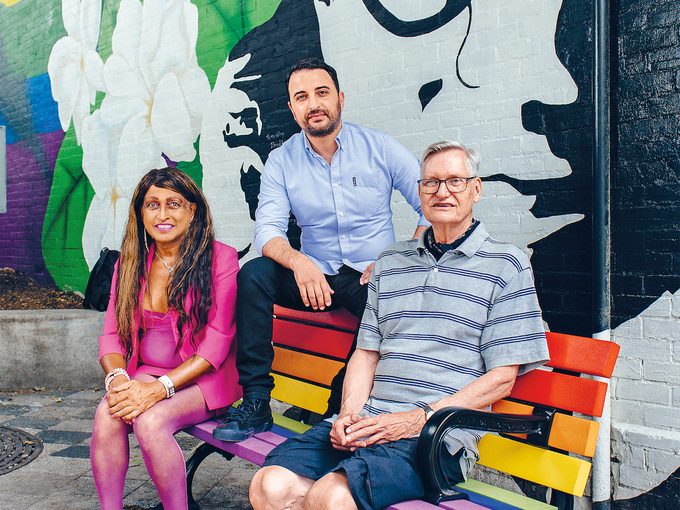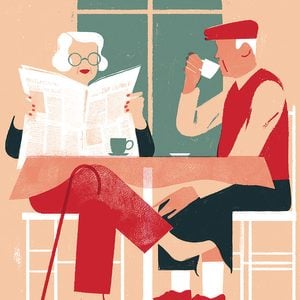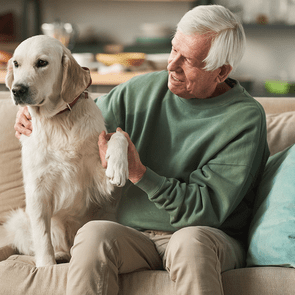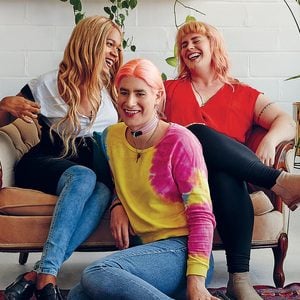This Program For LGBTQ Seniors Provides a Network—And a Lifeline
Toronto's 519 Centre offers older participants a way to connect with others in their community.

Just about every Monday afternoon for the past 12 years, Brian Sambourne has had a standing date. From 2 to 4 p.m., when there aren’t pandemic restrictions, he’s at The 519 community centre, a few streets away from his home in downtown Toronto, for a drop-in group geared to older LGBTQ2S (lesbian, gay, bisexual, transgender, queer or questioning, and two-spirit) adults. When social distancing is required, he joins via phone. Either way, casual conversation bookends programming that ranges from art tutorials to movie screenings to presentations on such subjects as wills and elder abuse.
For Sambourne, and many other seniors, the Older LGBTQ2S Adults Program is both a network and a lifeline. The 69-year-old retired teacher was originally attracted to the group for its topical advice; the first meeting he took part in was about exercise. While his desire to stay fit got him there, the group’s vibrant community is what has kept him and his partner of 36 years, Richard—both of whom lost many friends to the AIDS epidemic—coming back. “There’s a common history and there’s camaraderie,” he says. “This is a way of connecting with our generation.”
Since its start in the early 2000s, the program has worked to combat the isolation felt by older queer adults. One research report on the topic, published by the federal government in 2018, identified multiple risk factors. They include not being in a conjugal relationship (true for close to 50 per cent of LGBTQ seniors), having no children and feeling unwelcome at general programs for older adults.
Today, the group attracts about 50 people, including many racialized, trans and non-binary seniors. In addition to the original Monday drop-in, which includes a walking group, there’s a Friday online trivia-and-brainteasers event called Active Minds, which started during the pandemic; a weekly Friendly Check-In, which has older LGBTQ2S adult volunteers placing calls to peers isolated in their homes or long-term care facilities; and other initiatives, such as providing healthy snacks for participants, many of whom can’t always afford groceries. “For many older people, this is the only space in which they feel safe,” says the program’s 38-year-old coordinator, Moji Shirazi. “We respect and recognize our participants.”
PinkAngel Gonsalves joined the program three years ago. A 65-year-old trans woman of colour, she works as a caregiver and, along with her bichon frise, Sparkles (a fellow senior), lives in a midtown Toronto rooming house. She was already connected to the 519 through groups for trans people of colour and people advocating for seniors’ rights when Shirazi asked her to join his program. He knew she could offer valuable insight into the challenges of facing transphobia, racism and classism, but he was also confident she would make connections. Over the years, he’s learned that friendship can bloom if given the chance—and for Gonsalves and Sambourne, it has.
In July, a few of the program’s members visited Allan Gardens, a park and botanical garden near the 519. That’s where Gonsalves impressed Sambourne with her knowledge of botany. They chatted about the flowers’ Latin names and medicinal uses. For both seniors, it was a meaningful interaction that likely wouldn’t have happened if they weren’t participating in the group. “That lovely moment over the flowers is something I really value,” says Sambourne.
Gonsalves agrees. “When you have community like that, it’s not only appreciated but much needed,” she says. “Otherwise, I’d be bereft.”
Next, read up on how seniors are creating their own retirement communities—without leaving home.






